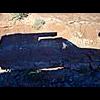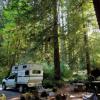I have a 2016 Ford F150, with a smart alternator and my 2019 FWC Hawk has a Blue Sea 7611 Auto Charging Relay with Aux Battery priority. During every trip I've taken, plus leaving my National Luna 50L Refrig/Freezer on all the time, I have never had a problem with getting my 2 x 6 volt 260 amp hour AGM batteries to 100% charge........ until this last trip.
In past trips I would drive to a location, such as Big Bend NP in the winter, or some high elevation mountain spot in Colorado and then only drive short distances to a trail head or fishing spot. The truck would sit most of the day in full sun and the 2 x 100 watt Renogy solar panels would fully charge the house batteries. When parked at home, the truck is in full sun and the batteries stay at 100%
This last trip I did about 400 miles on the IDBDR, so I drove most of each day, often in the forest and didn't setup camp until around 4pm. My batteries never got to 100%, so now I'm convinced I need a DC to DC charger. I never saw the need for one before this trip.
I'm thinking about getting Renogy's 20amp unit, it's reasonable and I'm assume if I drive for 5 hours it will yield 100 amps into my batteries which is more than I use in a day. So I have some questions for the electronic wizards in the group.
1- Is my math correct, will 5 hours of driving with a 20 amp DC to DC charger give me 100 amps?
One of the advantages of the 20 amp unit over a 30 amp or 40 amp unit, is that according to their website, with the 20 amp unit, Renogy specs out 8 AWG copper wire for runs 11- 20 ft from the starter battery and 10 - 8 AWG for runs 11- 20 ft to the house battery. (My current wiring done by the Montana FWC is 10 AWG. ) Their website also says to place the charger close to the starter battery, but reading this forum it appears most people mount the charger in their camper.
2- Does the DC to DC charger replace the Blue Sea 7611?
3- If the DC to DC charger doesn't replace the Blue Sea 7611, then does the charger get wired before the Blue Sea unit?
Thanks in advance.
Edited by larryqp, 16 July 2021 - 11:02 PM.
2016 F150, FX4, XLT super cab
2019 FWC Hawk Shell
2009 Ford Ranger 4x4, XLT, Supercab total loss on 7/30/19
2014 FWC Shell total loss on 7/30/19
Towed behind our home which is a 2005 Kountry Star Diesel Pusher















